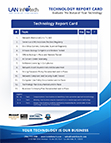Optimize your IT infrastructure with the right IT contract. Find out what should be included, and who you can trust.
When it comes to IT services and support, it can be difficult to know when you’re receiving the best possible deal, or when you are being “taken to the cleaners.” While there are always ways that you can tighten up any IT contract, how can you be sure you’re actually cutting non-critical services and not the ones that you really need?

This can be particularly challenging when negotiating IT managed services contracts—These are highly-detailed documents that can be confusing.
You must ensure you’re receiving the service levels that you expect. Learn negotiation tips from the pros, so you can cut the fat, and leave the important items untouched to keep your business IT running smoothly.
Cost vs. Value
The cost of ongoing services is often the first question that comes up, but, professional negotiators know that it’s not always advisable to select the least (or most!) expensive option.
Instead, it’s critical to find the services that correctly fit your organization’s requirements, and provide the essential services you need to maintain your daily business operations.
Selecting by price alone can end up costing you more money in the long-term. You may have to pay for supplementary services to cover items that aren’t a part of your managed services contract. This could be anything from disaster recovery in the event of a cyber security incident, to having someone available to help install critical upgrades and patches on a regular basis.
IT Service Models
There are three models of service that the majority of IT providers offer:
- Time and Materials: IT professionals may refer to this option as break-fix, which refers to the services that are offered. With this model, you agree on a discounted rate for problem-solving, such as resolving a specific issue or completing a large upgrade project. This may be offered in the form of a monthly allowance of hours, or a “block” of discounted hours that you can use at any time. This support is reactive, as your service provider is not engaged to work for you until something breaks and needs to be fixed.
- Managed IT Services: By far, this is the most comprehensive option. Managed IT Services allow a vendor to act as an extension of your internal IT department, or be outsourced as your primary IT partner. Managed Services Providers (MSPs) provide phone, email and web-based support, as well as critical upgrades and patches to managed software and network performance monitoring. Considered to be the most proactive solution, MSPs actively review your infrastructure and software configuration, often negotiating with other vendors on your behalf to ensure that your business information systems run efficiently and securely.
- Services Supplied by IT Software Vendors: When you purchase software, generally some level of support is offered by the software vendor if there are difficulties with their platform. These are very limited services, and typically only support the specific software that was purchased. They don’t extend to your entire network infrastructure.
So, What Do You Need?
There are specific options that you want to include in every IT contract. This is where details truly matter. The first, and most important question you must ask is whether costs are determined on a time-and-materials basis or a fixed-cost contract basis. Time and materials may be a better choice if you’re doing relatively simplistic and set tasks, such as upgrading to a specific system. In most cases, your best option is to negotiate a fixed time frame and budget for the work that’s to be done. This allows you to tightly define what success looks like, so you can accurately measure what’s accomplished against the agreed-upon deliverables. Your IT consulting firm should be able to review your needs and correctly assess the amount of time and effort required to make your desired changes.
Here are some of the critical services that your MSP should deliver as a part of their contract:
- Antivirus/firewall monitoring and updates
- Constant monitoring for new security patches, with immediate application to your systems
- Spam monitoring, spyware detection and removal
- Backup monitoring and disaster recovery services
- System optimization, with monitoring for hard drive disk space throughout the organization
- A ticketing system that allows your users to submit requests for service
Note that there’s a great deal of proactive monitoring involved with a quality managed services contract. This is because most IT issues are best solved when they’re detected early or prevented from happening in the first place. It’s customary for MSPs to bill separately for hardware such as new computers, on-site support and new software licensing. However, there may be significant discounts involved when working with your MSP. Always ask.
What You Don’t Need
When you go into the negotiation, it’s good to know some of the items that should be included in your contract. However, be aware that these items may incur an additional charge when working with a less-than-trustworthy MSP. Items such as phone support as well as email support shouldn’t incur additional charges, but should be included in your SLA (Service Level Agreement)—As should quick responses to your requests. Are there any hidden charges for changing, adding or removing users, or applying software patches? Be sure to always read the fine print, and think through all the possible scenarios that you may experience over the course of a year. These might include: upgrades, new software, adding employees, disaster recovery and more. Plus, consider any “upgrades” that should be included in the base cost of any agreement.
Learn more about how a proactive managed services provider can be a true partner for your business—One you can trust to only offer the services that you require. LAN Infotech is a respected IT Managed Services Provider in Fort Lauderdale. We’ll be happy to provide references from our satisfied clients to show that we’re trustworthy, and will keep your organizations’ best interest in mind. For more information, or a complimentary IT consult, contact us at (954) 717-1990 or sales@laninfotech.com.

LAN Infotech is a Microsoft Cloud Services Provider, IT Managed Support company and a leader in helping law firms, nonprofits and medical organizations deploy cloud solutions, manage computer networks, keep data protected and top technology management company. Businesses like yours need technology support to run highly-effective organizations.


